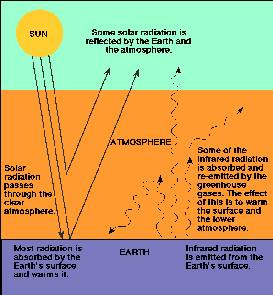|
from The Worldview Literacy Book copyright 2009 back to worldview theme(s) #23 |
| Discussion #23A: The steadily growing human population, and
especially the demands that their activities have placed on the Earth's
natural cycles in the last two centuries, increasingly threaten the
planet's biosphere. Two
hundred years ago that population topped one billion—today it is 6.7
billion. The 19th century
brought the scientific and technological understanding to really put the
energy stored in fossil fuels (coal, oil, natural gas, etc.) to work in
meeting human needs. Combustion
of fossil fuel, and the amount of the carbon dioxide (CO2)
gas given off in this process, steadily grew throughout the 20th
century. During the first
decade of the 21st century, human activity was putting around 50,000
million metric tons of CO2 (or its equivalent) into the
atmosphere every year.
Atmospheric CO2 plays a key role in the planet's
carbon cycle—specifically in the naturally occurring greenhouse effect
(see Figure #23a), where it helps to trap radiant energy the Earth would
otherwise lose to space. Human
activity adding so much CO2 to the atmosphere (see Figure
#23b) is enhancing the greenhouse effect.
The result is that more heat is trapped and the planet is warming
up—something the UN's
Intergovern- mental Panel on Climate Change (IPCC) concluded in early
2007 is a 90% to 95% certainty. While
less than one degree Celsius of warming has already occurred, the IPCC
cites computer models projecting future warming of between 1.1 to 6.4
degrees in the next century. Significant
global climate change might be expected disrupting natural ecosystems,
human society, and human comfort. How
serious is the problem? Some
feel that a six degree rise could "eliminate
most life on Earth, including much of humanity."
People can keep disruption
to a minimum by using fossil fuel energy more efficiently and
increasingly switching from it to renewable energy. Those embracing "Sustainability" are already doing this—but their environmental concerns go much beyond global warming. In general, they are disturbed by ecological debts humanity is incurring. This happens as irreplaceable resources are consumed or natural cycles disrupted in an impossible or difficult to fix manner. While people today benefit from such consumption or disruption, the consequences of ecological debt incurred today will be left to future generations to deal with. Those believing in "Sustainability" feel this isn't fair! They don't like imagining how the world might be in hundreds of years if "business is usual" continues: a much less biologically diverse place—because long ago people caused the extinctions of millions of species; one without oil, a wonderful source of hydrocarbons for synthesizing all kinds of things—because long ago people burned it; one in which inhabitants suffer through uncomfortably hot summers, contend with incredibly strong hurricanes in coastal areas, and can no longer live in places once inhabitable due to flooding by rising sea levels—
|
Discussion—continued because
people burned all that coal they mistakenly thought was
"cheap!"
Like those who respect "Environmental Economics" (theme
#40), those valuing "Sustainability" would also like to see
the market system put prices on things (like pollution, ecosystem
services, etc.) that reflect true environmental costs.
While gen- erally supporting the goals of
Greens and the Environmental movement (recycling, reducing one's
carbon footprint, preserving wilderness, etc.) they differ among
themselves over their commitment to "Enoughness." #23B: "Small
is beautiful" is often linked with a philosophy popularized in the
early 1970s by E.F. Schumacher, who was inspired by Gandhi.
It is a philosophy of enoughness.
It appreciates both human needs & limitations, and
appropriate technology—technology
with little or no significant environmental impact that is well suited
to an area since it makes use of what is relatively abundant.
Blasting notions that "growth is good" and "bigger
is better," Schumacher felt that "the aim ought to be to
obtain the maximum amount of well being with the minimum amount of
consumption." He
helped inspire a voluntary simplicity movement, based on simple,
ecologically grounded, non-consumerist lifestyles that people
voluntarily choose—typically for environmental, spiritual, or ethical
reasons. Those in the last
category may strive to use no more than their fair "ecoshare." For others, practicing enoughness begins with a thrifty
orientation and involves lots of creatively "making do."
Figure
#23a: The
Greenhouse Effect
Figure #23b: Atmospheric
CO2 Concentration
ppm=parts
per million source:
NOAA |
